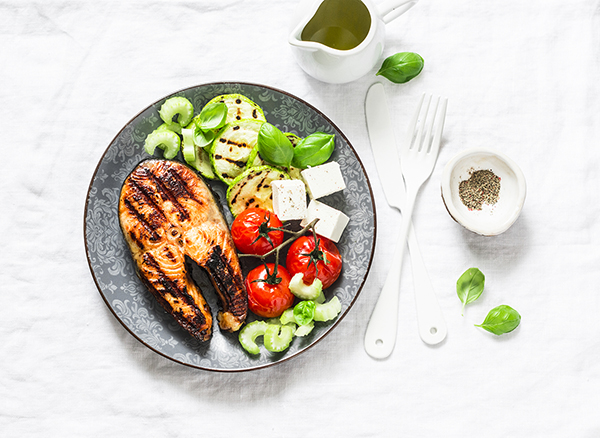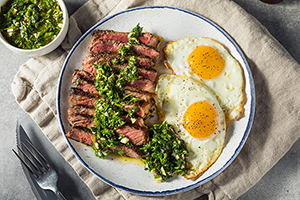



| By Dr. Ronald Hoffman

The Mediterranean Diet scores high in rankings by nutrition scientists. It’s the perennial #1 choice in the US News and World Reports annual rating of popular diets.
But as with the Paleo Diet, which has many variations and interpreters, the question is: which version of the Mediterranean Diet? One laden with white pasta and artisanal bread? Is it necessary to consume a generous daily serving of red wine? Do you have to eschew red meat, as some Mediterranean Diet advocates urge, when in actuality Mediterranean peoples traditionally consume hearty portions of beef, lamb and pork? Is it really low in saturated fat—belied by the popularity of cheese, full-fat yogurt, butter and pâté de foie gras in Southern European diets?
The answer is that the ideal Mediterranean Diet is in the eye of the beholder. If you’re not a fan of animal protein, it’s “plant-based”. If you spurn fat, then your version will be low in it. If you like pizza, which is actually eaten sparingly, if at all, in authentic traditional Mediterranean diets, it’s your license to enjoy it guilt-free.
What’s the right diet for high blood pressure?
It’s a sad fact that the Mediterranean Diet is an endangered species. Countries in the southern tier of Europe, North Africa and the Middle East have succumbed to the Western diet, rich in ultra-processed foods and sugar. The health benefits once associated with the Mediterranean Diet have receded in the face of soaring rates of obesity, heart disease, and diabetes. The Mediterranean Diet has been relegated to the status of a culinary ideal, as its Blue Zone enclaves shrink.
The popularity of the Mediterranean Diet concept is in large part the result of research performed in the 1950s by nutrition pioneer Ancel Keys—one of the most venerated and yet simultaneously reviled figures in nutrition history. He performed comprehensive studies of the diet habits of post-war Europeans and concluded that low-fat diets—epitomized by the Mediterranean Diet—safeguarded against heart disease. The “Lipid Hypothesis” was born. Warring camps in the field of nutrition are still battling it out, with critics claiming Keys’ methodology is deeply flawed.
Ideally, the Mediterranean Diet delivers plentiful dietary polyphenols. In its original form, it’s not ultra-processed, and added sugar is kept to a minimum. There’s an abundance of fish, rich in Omega 3s. And while it’s not low-carb, its fruits, vegetables, grains and legumes are high-fiber and low in glycemic index, meaning their sugars are slowly time-released. The red wine is rich in resveratrol, the reputed basis of the “French Paradox”. And there are lots of fresh herbs, like oregano, rosemary, thyme, and basil.
Then there’s extra-virgin olive oil, which in itself can be considered a “superfood”. It’s laden with healthy polyphenols including hydroxytyrosol and oleuropein.
What’s not to like? In my experience, the Mediterranean Diet—correctly interpreted—can be an excellent option. But its studied benefits were appropriate to active people subject to periodic deprivation in traditional societies. Perhaps not to overweight Americans requesting extra portions of hot crusty Italian bread in an all-you-can eat Mediterranean-themed eatery.
Ask Leyla: Should I start drinking red wine for heart health?
For those with metabolic syndrome, it would be advisable to follow a lower-carb version of the Mediterranean Diet—less sugary fruit, flour products, and tasty desserts like tiramisu and baklava. Alternatively, there are some who are intolerant to wheat and dairy—plentiful in the Mediterranean Diet. And encouraging everyone to drink red wine to garner its heart-benefits (now being rethought) is asking for trouble.
If the Mediterranean Diet gives at-risk people license to eat the wrong foods with impunity, it’s doing them a disservice.
And, sure enough, that’s what a new study from the Department of Medicine at Rush Medical School indicates. Researchers analyzed how closely each of the study participants adhered to an ideal Mediterranean Diet, then rated them for departures in the direction of an ultra-processed diet (fried foods, refined grains, sweets, processed meats, and pizza were among the indulgences).
Participants who adhered most closely to a traditional Mediterranean Diet had a slower progression to cognitive decline than those whose Mediterranean Diets were interspersed with liberal amounts of junk. Those with poorest adherence to a Mediterranean Diet posted cognitive scores 5.8 years older than their counterparts who didn’t stray!
A quick glance at the menu for the Olive Garden, a Mediterranean-themed restaurant, illustrates the potential pitfalls. While it’s possible to order a virtuous Herb-Grilled Salmon (460 calories) or a Grilled Chicken Margarita (540 calories), they’re listed alongside Asiago Tortelloni Alfredo with Grilled Chicken (a whopping 1980 calories) and the Tour of Italy, a potpourri of cheesy pastas (1550 calories). Bon appétit!
As long as we’re eating Mediterranean, let’s top it off with dessert: The Olive Garden Warm Italian Donuts (810 calories) look tempting, as does the Chocolate Brownie Lasagna (910 calories).
These dishes are about as far-removed from hearty Mediterranean peasant fare as General Tso’s Chicken (1577 calories per serving) is from traditional Chinese cuisine.
Early in my career, I propounded a version of the Mediterranean Diet which I dubbed the Salad and Salmon Diet. I urged people to “eat as if the flour mill had never been invented”, invoking the advantages of the Paleo and low-carb diets, and to stick to unprocessed, organic natural fresh fruits in moderation, legumes, nuts, vegetables, fish, meats, eggs, poultry, dairy and whole grains (where tolerated). Keeping sugar and starch to a minimum, especially for those less active or with weight problems, helps arrest the progression to the metabolic derangements to which most Americans are susceptible.
When dining out, which I do rarely unless I’m on the road, I gravitate to the simple unadorned dishes that can be found in Greek, Turkish and Spanish restaurants.
For a practical guide to the authentic Mediterranean Diet, see Mediterranean Living
Though we think of declining estrogen as the hallmark of menopause, it's actually common for…

Up to 12 percent of Americans have ulcers at some point in life. Peptic ulcers…
Gallbladder disease is a modern illness. An estimated 20 million Americans have gallbladder disease. The…

Dr. Antonio Bianco, recipient of the American Thyroid Association’s John B. Stanbury Thyroid Pathophysiology Medal,…

There’s a misconception among low-carb dieters. Many people believe a low-carb diet is much higher…

New, more powerful weight loss drugs: Drugs like Wegovy, Rybelsus, Ozempic and Mounjaro/Zepbound are revolutionizing…

Leyla Weighs In: Eating for Energy and Emotional Well-Being

Our virtual voicemail is open 24/7, so there's no need to wait to submit your questions for Dr. Hoffman. Leave a message, and you may hear your question featured on the Intelligent Medicine radio program!